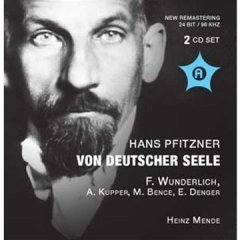Hans Pfitzner – Von deutscher Seele (2012)
Hans Pfitzner – Von deutscher Seele (2012)

1. Mensch und Natur Part I 2. Mensch und Natur Part II 3. Mensch und Natur Part III 4. Mensch und Natur Part IV 5. Mensch und Natur Part VI 6. Leben und Singen Part I 7. Leben und Singen Part II 8. Liederteil Part I 9. Liederteil Part II 10. Liederteil Part III Annelies Kupper, soprano Margarethe Bence, alto Fritz Wunderlich, tenor Ernst Denger, bass Philharmonischer Chor Stuttgart Radio Sinfonieorchester Stuttgart Heinz Mende, conductor Stuttgart, Liederhalle, 27.X.1958
Von deutscher Seele, cantata for soloists, chorus, organ & orchestra, Op. 28. With the triumphant Munich premiere of Palestrina on June 12, 1917, Pfitzner became de facto spokesman for German musical conservatism, perversely targeting Busoni as his bête noire and attributing to him everything threatening the comfortable post-Romantic vein within which he'd carved his own peculiar niche. The month before, Pfitzner published his attack on Busoni, "The Danger of Futurism." "Futurism" was a loaded word. Busoni cast a skeptically sympathetic eye on the Futurists, a movement led by polemicist and animateur Filippo Tommaso Marinetti. The most often reproduced portrait of Busoni was painted by Futurist Umberto Boccioni. But Futurist musicians were never taken seriously, as large ideas -- for instance, Luigi Russolo's book The Art of Noises -- yielded little achievement. Linking Busoni with Futurism amounted to a vicious slander prompted by wartime chauvinism. An Italian, Busoni was felt to be a "foreign body" in German musical life, yet it was unforgivable that he should have taken refuge from the Great War in Switzerland, while Pfitzner remained in Germany. In 1919 Pfitzner again attacked Busoni in the inflammatory pamphlet "The New Aesthetics of Musical Impotence." But when Busoni returned to Berlin in 1920, he, Pfitzner, and Franz Schreker were appointed by former Busoni pupil Leo Kestenberg, musical advisor to the Prussian Ministry of Science, Culture, and Education, to lead prestigious master composition classes. Pfitzner's Welanschauung was more obviously challenged by Schreker, the sensationalist purveyor of musical eroticism, but it was Busoni for whom his venom was reserved. Pfitzner's Palestrina depicted that composer as a savior of the ancient polyphonic tradition challenged by the rise of the Florentine Academy and its invention of opera, a situation similar to his own conservative neo-Romanticism amid burgeoning Modernism, and it is not too much to see in his Romantic cantata Von deutscher Seele, composed in 1921, his own Pope Marcellus Mass -- a credo and testament. For soloists, chorus, and orchestra, playing around an hour and 40 minutes, this gargantuan work (close to the sound-world of Mahler's "Symphony of a Thousand") visits attentions upon Eichendorff's slender, gnomic verses whose opening line -- "It's all quite other than you think" -- forecasts the chimerical gist of the whole. The German soul, apparently, is riven with abysses and sudden reversals. First performed in Berlin on January 27,1922, Von deutscher Seele soon gathered an enthusiastic following. In 1928 Othmar Schoeck set several of the same poems in Wandersprüche, for baritone and chamber orchestra, in a compactly acerb manner looming as a proto-expressionist antithesis to Pfitzner's aesthetic. --- Adrian Corleonis, Rovi
download: uploaded yandex 4shared mediafire solidfiles mega filecloudio nornar ziddu








